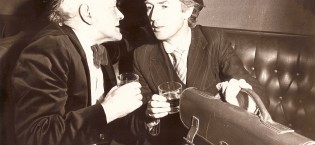“Shadow And Substance”
Every play worthy of the name has a theme, whether it is the simple portrayal of historical events and the interaction of motives of those involved, or the giving of an example of events in possible life, real or imagined, which will serve a medium for a message: which message given badly in abstractions would not directly appeal to our “darkened minds”. The play, when written, must be presented to an audience. This is done by players. The question of whether these players may interpret to some or any extent the original delineation or should rather act puppet-like (possibly masked?) is a question much debated (but not here).
This introductory word is very necessary, though possibly extremely obvious. However, it follows from it that there are certain laws governing criticism. First of these is that there are two entirely different classes of critics. The one evaluates the play’s writer as craftsman, and his achievement in the portrayal of his theme. The other critic evaluates the players’ portrayal of the play to an audience.
I come now to this second service for “Shadow and Substance” and the players, Sligo Drama Circle. This is a play which has, or had, much to say and which has often said it. It portrays the interaction of two personalities, “the man O’ Flingsley” and Canon Skerritt. The former, author of a dangerous book, full of bitterness we are led to believe, the latter a pompous clergyman racked with the sin of spiritual pride. The Canon’s one redeeming feature, his love for his retarded serving-girl, is tainted itself for it only serves to show the priest the proper relationship he imagines necessary between the intellectual and the books. O’ Flingsley, in his bitterness against a system, has attacked another victim of that very system. O’ Flingsley has fallen into the trap of believing with Langland’s Piers that “The clergy and others like them speak readily of God, and His name is often in their mouths; but lowly men have Him truly in their hearts”.
The play, of course, is dated. The teacher is now no parochial hack – no ideal yes-man as is the Canon’s protege, O’ Connor. Sligo Drama Circle chose to produce this play for some reason which completely escapes me. They are obviously a group capable of better things. Maybe they decided that we need to see again some of these plays of our time which make a standard of comparison. Let us hope, however, that this approach will not continue to be their attitude.
Edward Fitzpatrick played the Canon. He did achieve the first success of acting – the Canon was there. Not possibly the Canon one would have wished to see, but very definitely a solid representation of one view of what the Canon is. Mr. Fitzpatrick is a fine actor – to those who have had the pleasure of seeing him act before this must be obvious. There is material here for a producer. The producer did not make all that could have been made of Mr. Fitzpatrick’s Canon (or was it the producer’s Canon?). Vivian Francis played the school master. This part, too, was played well. But he seemed to take his attitude from the Canon. The two characters are obviously very alike but only in their fundamental beliefs. In all externals they should surely be more counterposed than we saw them here. This O’ Flingsley was not the embittered, intellectual wasting a fine human life on a small town, knowing he was wasting it yet desperately believing somehow he was still right. This O’ Flingsley would never have written “I am, Sir Oracle”, though he might have done anything else. The movements of both players were very, very good (though sometimes the Canon seemed to be restricted by an invisible fence).
Between these two comes Brigid (Joan Fitzpatrick). I am afraid I simply do not know what the author intended Brigid to be. To me she represents absolutely nothing. This, of course, is not to say that Joan Fitzpatrick did not play well. She played wonderfully. Her playing opposite the Canon was really good. She has a fine talent. Unimaginative lighting, however, detracted from her fine performance. Her announcements of her “visions” I particularly liked. I was sorry that my aversion to the awful part of Brigid detracted from my pleasure in the playing of this actress. Brigid is a completely irrelevant character.
The others in the cast – I enjoyed very much Ray Cawley and Dolores Carr as O’ Connor and his aunt. They were nearly too good in the parts they played. I do not mean to suggest any reflection on the main players when I say that these two somehow stole whole sections of the show. Frs. Kirwan and Corr represented a mercifully dying race – the bostoon curates of our land, unshaven football fanatics, believing in good, clean spot as relief for dubious energy. They, too, were very much there, played by Michael Gunning and Seán O’ Reilly.
So far, I have restrained myself from the temptation of showing off some nagging talent by making trite remarks (so loved by festival adjudicators) such as “Did I notice a flaw in the wallpaper beside the bookcase?” I will, I hope maintain this standard. There were no major flaws in the production techniques. This play has been better produced before this and maybe will be better produced again; nut its essential lack of universal message, the fact that it did date, makes production difficult. It is surely their universal relevance that distinguishes the plays that are classics. This play is no classic.
The set I very much liked, nicely balanced as it was. To conclude, I will refer briefly to the outline characters Mullahone (Denis Barrett) and Mrs. Mullahone. Martin Mullahone looked rather too sophisticated to me, to be the country nick he is said to represent through the entire scene in which he appeared was helped by him and his wife “Rosy Violet” nicely played by Imelda Mulligan. The Canon’s niece, Thomasina, I liked, I fear, because she is a fine representation (played by Betty Bourke) of all that is worst in our vacuous-minded population of young ladies so necessary to the continuance of the race but such a curse to the minds of men like Canon Skeritt.
This play is not being entered for festivals, I believe. Another time I hope to say something on this very vexed question. Suffice it to say that this group and their producer, Miss P. Dowling, would undoubtedly have added extra polish had they had festivals in view. Would it have been worth it? After all is amateur acting not for the players and the audience rather than for medals and cups.
from The Sligo Champion, by A. J. Cooper, April 25th, 1964
Tags: History, Paul Vincent Carroll, Press Reports, Productions, Reviews








